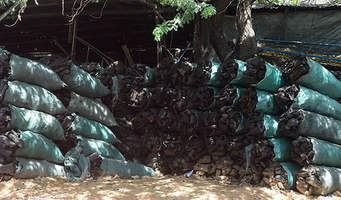Charcoal prices in Mogadishu sky rocket over increased rains

The livelihoods of thousands of vulnerable families, including IDPs in Somalia’s capital city, Mogadishu have been hardly hit by steep rises in the price of charcoal, the main fuel for cooking in Somalia and most of East Africa nations.
A 50 kg sack of charcoal reached 220,000 Somali shillings (US$ 11), up from 120,000 shillings (US $6) and this is an increase 91% which made many poor families to firewood.
Issaq Adan Ahmed, who sells charcoal at Tarbuunka told Goobjoog News that the low charcoal supplies have been attributed to the rainy season as there are no charcoal trucks coming to the city.
“The steep rise of the charcoal price has been caused by heavy rains that have been pounding weeks. Before recent months, we use to get between 6000 and 7000 bags per day but now we hardly get 1000 bags” he said.
“We used to buy two full sacks of charcoal per month but due to the high price we buy a tin daily,” Asha Ahmed told Goobjoog news.
In the Khadiija Abdirahman Ahmed household, the rise of charcoal price has left little money for food.
“We opted to buy firewood though both charcoal and firewood sky rocked but we can buy firewood”
The huge volume of trade in charcoal was clearly visible on the streets of Mogadishu months ago, with long convoys of up to 20 or more heavily-loaded charcoal trucks moving along the roads or lined up on the outskirts of the city.
This comes barely four days after a report by Nairobi based campaign group, Journalists for Justice, accused KDF, Jubbaland administration and Al-Shabab of getting revenue from the exportation of charcoal.
The report notes that the port taxes $3 a bag on exported charcoal, which is then split between Jubbaland, KDF and Al-Shabaab. Until recently, the export volumes were around 1 million bags a month equaling revenue of $24 million a year, JFJ says.
Al-Shabaab also taxes charcoal production before the bags reach the port and it has a stake in the market value of the cargo when it reaches its destinations in the Middle East. But the situation is almost out of hand as local and international intervention to curtail the cartel’s efforts are met with resistance and threat of non cooperation in the war on terror in the region.
The period since the collapse of Somalia’s central government in 1991 has coincided with a voracious demand for ( Black Gold) charcoal in the Arab States, particularly Saudi Arabia and Dubai. Restricted by their own laws on charcoal production and deforestation, countries in the Arab States have taken full advantage of lawless Somalia.
Exports of charcoal were temporarily slowed in the mid-1990s when the faction leader in charge of Mogadishu and its port, General Mohamed Farah Aydid, imposed some restrictions on exports. However, following his death, competing factional leaders have openly exploited and encouraged the trade.
As the UIC began to take control of security in various areas of southern Somalia from 2000, some local leaders made attempts to contain the devastation. As early as July 2000, a circular signed by Tahlil Mahmud Ibrahim, representative of the Islamic courts of Shabelaha Hoose Region, southern Somalia, banned the cutting of trees, threatening strict punishment under Shari’a law.